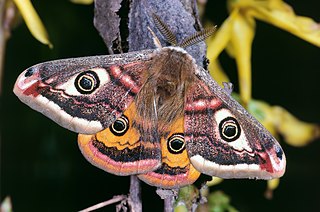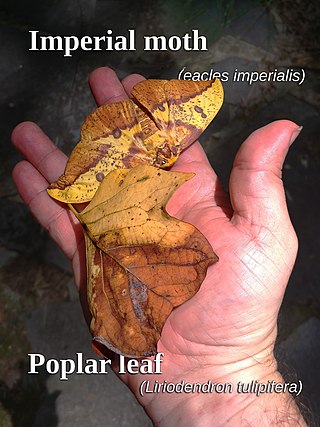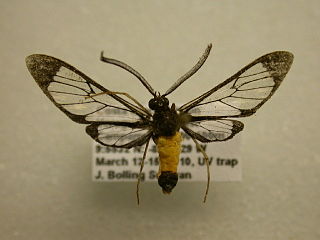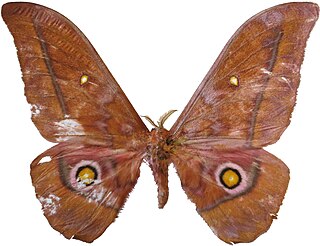
Saturniidae, members of which are commonly named the saturniids, is a family of Lepidoptera with an estimated 2,300 described species. The family contains some of the largest species of moths in the world. Notable members include the emperor moths, royal moths, and giant silk moths.

Eacles is a genus of moths in the family Saturniidae. They are native to the Americas. The genus was erected by Jacob Hübner in 1819.

The Saturniinae or saturniines are a subfamily of the family Saturniidae, also known as giant silkmoths. They are commonly known as emperor moths or wild silk moths. They are easily spotted by the eyespots on the upper surface of their wings. Some exhibit realistic eye-like markings, whilst others have adapted the eyespots to form crescent moon or angular shapes or have lost their wing scales to create transparent windows. They are medium to very large moths, with adult wingspans ranging from 7.5 to 15 cm, in some cases even more. They consist of some of the largest sized Lepidoptera, such as the luna moth, atlas moth, and many more. The Saturniinae is an important source of wild silk and human food in many different cultures.

Mesothen is a genus of moths in the subfamily Arctiinae. The genus was erected by George Hampson in 1898.

Eacles oslari, or Oslar's eacles, is a moth of the family Saturniidae. It is found from the Santa Rita, Patagonia, Atascosa and Huachuca mountains of southern Arizona south into Sonora, Sinaloa and Chihuahua in Mexico. Wings vary from yellow to purple brown. The species was first described by Walter Rothschild in 1907.

Arsenura is a genus of moths in the family Saturniidae. The genus was erected by James Duncan and John O. Westwood in 1841.

Bunaeopsis zaddachi, or Zaddachi's emperor moth, is a moth of the family Saturniidae. The species was first described by Hermann Dewitz in 1879. It is known from Africa, including Tanzania.

Anisota oslari, or Oslar's oakworm moth, is a moth of the family Saturniidae. It is found from south-western Colorado south through New Mexico and south-eastern Arizona to far western Texas and Mexico.

Microdulia is a genus of moths in the family Saturniidae first described by Karl Jordan in 1924. It contains only one species, Microdulia mirabilis, described by Rothschild in 1895, which is found between 35° and 47°S in Chile and Neuquén in Argentina.
Periga is a genus of moths in the family Saturniidae first described by Francis Walker in 1855.

Aurivillius is a genus of moths in the family Saturniidae first described by Alpheus Spring Packard in 1902. They occur in Sub-Saharan Africa.

Bunaeopsis is a genus of moths in the family Saturniidae. The genus was erected by Eugène Louis Bouvier in 1927.
Pseudoludia suavis is a species of moth in the family Saturniidae. It was described by Rothschild in 1907. It is found in Tanzania and Malawi.

Rothschildia orizaba, the Orizaba silkmoth, is a moth in the family Saturniidae. The species was first described by John O. Westwood in 1854. It is found in Mexico, Central and South America.
Gonimbrasia tyrrhea, the zigzag emperor moth, is a moth of the family Saturniidae. The species was first described by Pieter Cramer in 1776. It is found in central and southern Africa.
Bunaeopsis phidias is a moth of the family Saturniidae. It is known from Africa, including Tanzania, Eritrea, Malawi and Zambia.

Nudaurelia xanthomma is a moth of the family Saturniidae. It is known from Cameroon, Ghana and Sierra Leone.












